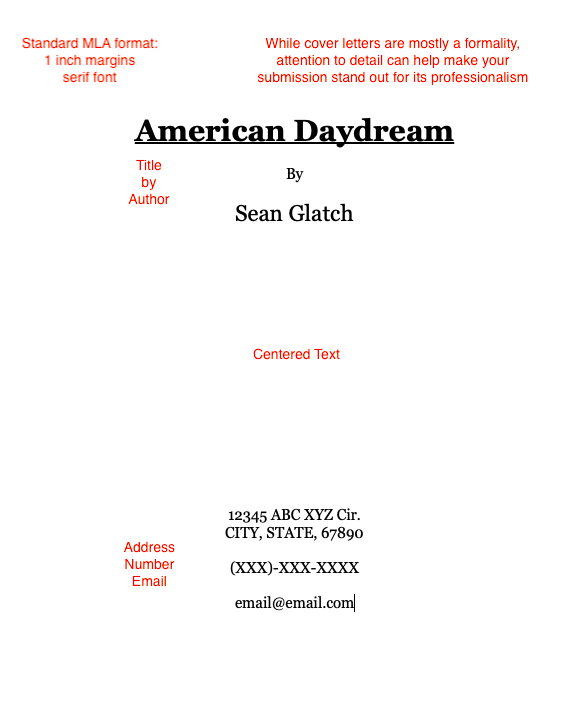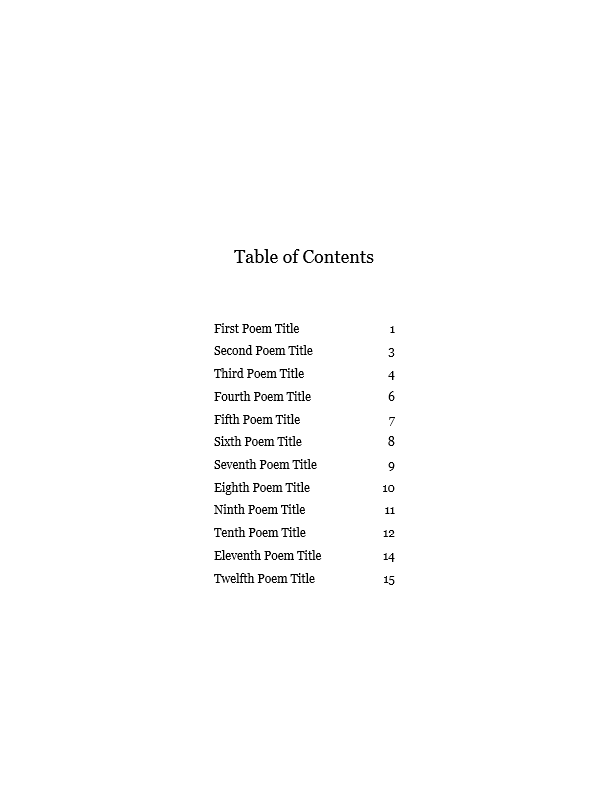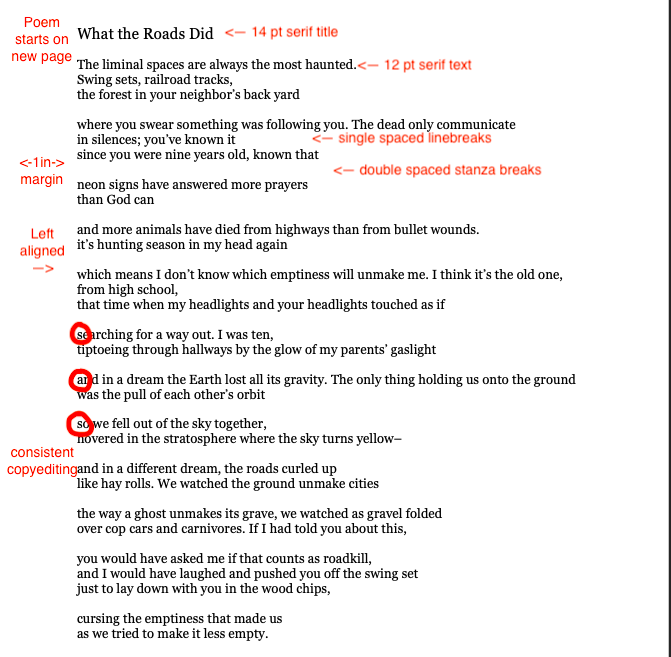After months of writing, editing, rewriting, hair-pulling, and late-night coffee sessions, you have a finished poetry manuscript. There’s only one thing standing between you and submitting your poetry for publication: the poetry manuscript format.
Poetry manuscript submissions must conform to certain formatting guidelines to even be considered by publishers.
Poetry manuscript submissions must conform to certain formatting guidelines to even be considered by publishers. Publishing houses often post guidelines for submissions and contests, but even then, there are some formatting styles you need to conform to if you want your manuscript to be taken seriously. Below are nine essential tips on how to format a poetry manuscript, as well as advice for navigating the world of publishing poetry; but first, let’s understand the two types of poetry publishing opportunities that exist.
9 Essential Poetry Manuscript Format Tips to Get Published: Contents
- Free Resource: Formatted Poetry Manuscript Example
- Poetry Manuscript Format Tips
- 1. Start With a Cover Sheet
- 2. Include Pages Numbers and a Table of Contents
- 3. Include Acknowledgments to Previous Publications
- 4. Start Each Poem on a New Page
- 5. Use Clearly Defined Page Breaks
- 6. Follow MLA Style Conventions
- 7. Use a Serif Font
- 8. Use Consistent Copyediting
- 9. Organize Your Poems Thoughtfully
- Poetry Manuscript Formatting: Read the Guidelines!
Free Resource: Formatted Poetry Manuscript Example
As you read the guidelines on how to format a poetry manuscript below, follow along with a free resource: an appropriately formatted, editable example poetry manuscript with a cover page and a table of contents.
The editable manuscript is in .docx (Word document) format. You can download it for free here:
Poetry Manuscript Format Tips
Ready to submit a poetry manuscript? Then let’s get to formatting! Many publishers won’t consider your poetry manuscript submissions if they don’t adhere to the following 9 poetry manuscript format tips.
1. Start With a Cover Sheet
The first page of your poetry manuscript should be a cover sheet. The cover sheet is mostly a formality, but it includes all of the important information a publisher needs to contact you. On top of your name and the title of your manuscript, a cover sheet includes your phone number, email, and physical address. Here’s a great example of a cover sheet, though a quick web search should show you the general page format.
Above is an example of a cover sheet which I submitted for a chapbook content a couple years back. Your cover sheet doesn’t need a ton of editing, but be sure to follow MLA conventions and present yourself with authority and professionalism.
Article continues below…
Poetry Manuscript Courses We Think You'll Love
We've hand-picked these courses to help you flourish as a writer.

Putting It All Together: Completing Your First Poetry Manuscript
How do you put together a poetry book? From choosing a theme to ordering your poems, you'll end this course...
Find Out MoreOr click below to view all courses.
See CoursesArticle continues…
2. Include Pages Numbers and a Table of Contents
After your cover sheet, a table of contents will help make a good impression on the reader. The table of contents helps the reader navigate your manuscript so they can return to the poems that they especially like. Additionally, it shows that you’ve taken care in the placement of each poem in the manuscript, and if your book has sections, a table of contents can highlight how the manuscript is sectioned. Placing page numbers within the manuscript will also demonstrate this care and make it much easier to create the table of contents.
Here is an example of a table of contents for a poetry manuscript. The formatting doesn’t need to be fancy: you can format it left flush or centered, just use consistent copyediting and include page numbers for each work.
3. Include Acknowledgments to Previous Publications
Many poetry publishers will allow a fraction of the manuscript’s poems to be previously published. However, you need to acknowledge those previous publications.
For example, Writers.com instructor Jonathan McClure has a poem titled “A Prayer” published in Nashville Review. If Jonathan includes this poem in a manuscript submission, he would want to write in the acknowledgments page that “‘A Prayer’ is previously featured in Nashville Review.”
4. Start Each Poem on a New Page
Start each poem with a properly capitalized title, and be sure that only one poem occupies each page. Additionally, try to give all of your poems captivating titles. “Untitled” poems tend to show a lack of care for the poem’s language, unless the subject matter of the poem has a relationship to the word “Untitled.”
5. Use Clearly Defined Page Breaks
When entering your poems into the manuscript, create a new page by clicking “page break” in the word editor you use. Most word editors list “page break” under the “Insert” tab. Page breaks make it much easier to edit your manuscript, because if you start a new page by hitting enter several times, then the changes you make to one poem will affect how the poems are formatted on every other page. Additionally, repeatedly hitting enter can mess up the formatting on the document when you finally click submit.
6. Follow MLA Style Conventions
When in doubt, MLA formatting requirements often align with poetry manuscript formatting guidelines. These formatting conventions outline how poems should be formatted in terms of their line breaks, margins, and text size. Keep the following MLA guidelines in mind:
- Single space all linebreaks in the poem.
- Double space between stanzas.
- Input 1-inch margins on all sides.
- Use a 12pt font on all text.
- Use a 14pt font for the title.
- Keep poems left-flush on the page, unless the text flushing has a relationship to the poem.
Above is a poem I published a few years ago in Bombus Press, edited to reflect the essential page formatting for a poem.
7. Use a Serif Font
Serif fonts are fonts which have small strokes at the end of longer strokes. For example, a serif capital “T” has small lines at the end of each longer line. Serif fonts—such as Times New Roman or Garamond—look much more professional, and they will not distract the reader from your work.
8. Use Consistent Copyediting
Your manuscript reader will take great care with each word in your manuscript, so they will certainly notice inconsistencies in your manuscript’s spelling, punctuation, and capitalization. Do a thorough copyedit of your manuscript, and make sure it meets today’s grammatical standards. Owl at Purdue has a great library of resources to check on grammar rules you’re not sure of!
One important note on copyediting is how you capitalize the beginning lines of your poems. Antiquated poems capitalize the first letter of each line, even if it didn’t start a new sentence. Contemporary poetry, however, does not capitalize the first letter of a line, unless it starts a new sentence. Over-capitalizing your words may make your writing seem pretentious and out-of-touch.
9. Organize Your Poems Thoughtfully
No discussion on how to format a poetry manuscript is complete without also discussing how to put together a poetry manuscript and organize your poems. A poetry manuscript is more than just a collection of well-written pieces; put together, a manuscript should offer a window into the poet’s heart and tell an important story.
A poetry manuscript is more than just a collection of well-written pieces; put together, a manuscript should offer a window into the poet’s heart.
For example, the poetry book Deaf Republic by Ilya Kaminsky tells a story in two acts: in the first act, the village members of an occupied town pretend to be deaf after the military kills a deaf boy. In the second act, the townspeople fight back by seducing the soldiers to their deaths. This story is told in verse, yet each poem can stand on its own while also being strung together in a cohesive narrative.
Alternatively, Sam Sax’s A Guide to Undressing Your Monsters tells a story in five sections. Each section corresponds with the poet’s coming-of-age as a queer person, and the poet grapples with masculinity and sexuality by characterizing himself a monster slowly unzipping.
The best way to figure out the structure of your poetry manuscript is to read other poetry books and pay attention to the way those books are formatted. Nonetheless, the following are common ways to organize a poetry manuscript.
Chronological Poetry Manuscript Formatting
The easiest way to organize your manuscript is chronologically, sorting the poems based on when they were written. This method of organization can highlight the changes you experienced as a person and as a writer; however, you may run the risk of putting less-developed poems first.
Keeping Linked Poems Together
You might organize your manuscript based on which poems fit next to each other, kind of like a puzzle. For example, you might make your first poem about love, your second poem about love and death, your third poem about death, your fourth poem about death and forgiveness, your fifth about forgiveness and family, etc.
Themes-Based Organizing
If your manuscript has obvious overarching themes, you can organize your poems based on those themes. You still need to tell a story within each section, but sectioning these poems by theme can help the reader understand the intent of your manuscript.
Braided Narratives
If you have several overarching narratives, you could braid them together and alternate poems so that these narratives coincide with each other. That way, your poetry manuscript tells a story from start to finish, but the themes and narratives of the manuscript remain fresh and exciting.
Learn more about writing and organizing a poetry collection here:
Poetry Manuscript Formatting: Read the Guidelines!
The most important thing you can do before submitting your poetry manuscript is read the publisher’s guidelines. These will tell you specific poetry manuscript format requirements, what the poetry manuscript length should be, and any tips they can offer to successfully publish your poems. Any manuscript that doesn’t meet the publisher’s guidelines will likely be discarded, so don’t let your hard work go to waste—read the guidelines thoroughly!
Any manuscript that doesn’t meet the publisher’s guidelines will likely be discarded.
With these formatting tips and the publisher’s guidelines in mind, you have a great shot at getting your poetry manuscript published. If you’d like a head start on a properly formatted poetry manuscript, download our editable sample manuscript as a .docx (Word document) file:
If you want to learn more about the business of publishing, check out our article on how to get poetry published.
Nail Your Poetry Manuscript Formatting at Writers.com
Want to make that shot even better? Get an extra set of eyes on your manuscript from the poets in our creative writing community, or sign up for a poetry writing course to get an expert’s feedback on your writing.
Good luck on getting your poetry manuscript published, and let us know if you win any publications!





I have a question about using line breaks and paragraph marks to format poetry in Word documents. When I download your editable example poetry manuscript, open it in Microsoft Word 2010, and then command Word to show all line breaks and paragraph marks, I see that you use the two interchangeably. For example, the breaks between stanzas use a line break after stanzas 2, 4, and 5, but a paragraph mark after stanzas 1 and 3. Within the stanzas, all lines end in a line break except lines 1 and 3 of stanza 1, lines 1 and 3 of stanza 3, and line 3 of stanza 6.
Now, because your manuscript’s paragraph formatting in Word is set to single spacing between lines, and no additional spacing before or after paragraphs, it’s true that both the line breaks and paragraph marks result in the same single space after the line when the manuscript is displayed or printed in Word. But might this not be same if the person receiving the manuscript uses different editing software, or a different means of importing the .docx file into their software? Have you experienced or heard of any difficulty in that regard?
Hi, like to know if when submitting a poem to a poetry contest, can you add an image or photo of your own in the contestant form and how? Thanks
Hi Anna,
It depends on the contest and the form you’re using, and it also depends on whether or not the contest will accept digital media as part of the submission. This should be answered in the submission details for the contest, but if they aren’t, it would be best to email the contest before you submit, as different contests have different rules and preferences. Best of luck!
Dear Sean,
I can’t thank you enough for this useful page. I’m going to follow it to a ‘T’!
Thanks again!
Certainly, Elizabeth! Best of luck!
Hi! I was curious about capitalization within the manuscript. A part of my style is writing in lowercase letters unless to emphasize a particular word. I was curious if I should keep it written in my specific technique for the book’s story or adhere to standard capitalization. The publisher I was going to submit to didn’t have clear guidelines.
Hi Justin,
There aren’t clear guidelines for style items like what you’re mentioning, but I wouldn’t worry about that–since your lack of capitalization is intentional, it wouldn’t be right to change your style. The right publisher will get it!
I am self publishing, and I have around 60 pieces going into my poetry book. In regard to Table of contents, should I use several pages or make two columns on 2 or 3 pages?
Hi Al,
Good question! Poetry books typically have a single-column table of contents that extends into multiple pages.
Best of luck publishing your collection!
Warmest,
Sean
Sean this is wonderful information as I continue working on my book!
I will also sign up for your newsletter!.
Thanks so much!
Eileen
My pleasure, Eileen, best of luck!
Hi there,
I have a question, will you recommend to add a preface or an acknowledgment before the table of contents for the manuscript?
Hi Andrew, good question! Those items won’t affect whether your book will get published, but you’re welcome to add them to your manuscript. 🙂
I have been writing poetry, prayers and have written on life in general for over 40 some years. They are mostly spiritual in content for the most partand have never been published. If I were to send a poem, prayer and one of my written articles to you, could I get a critique of my work with one of your instructors?
Hi Cheryl,
Certainly! You can read how private coaching with Writers.com works here: https://writers.com/one-to-one
That link also lists some of our available instructors, alongside their private coaching rates. If you’re interested in receiving coaching, please email writers@writers.com, and we’ll be happy to connect you with an instructor. 🙂
Thank you for the information.
Rich Berg
Do you copy edit poems for those with complete manuscripts?
What do you charge, and how long of a process is it for approximately 70 pages?
Also. . . . Is it a good idea to format the manuscript in Google docs if I don’t have Word?
Hi Al,
Thanks for your comment! Email me at sean@writers.com and I can help connect you to the right editor.
Thank you for all of this helpful info! I’m a novice but have journaled poems, prose and essays for years. A unique experience spanning a little over a year, almost wrote itself into a book of poetry. I’m confident that what I have is so original, that it will sell. I just don’t have time to figure it all out. Looking at the services that you provide, do I begin with contact with an editor, or an instructor? Should I copyright before I let anyone see anything, or are there some issues with copyrighting too soon before speaking with a would-be publisher? Thanks again!
Hi K.,
Congratulations on being ready to put a book together! You might benefit from private coaching with one of our instructors, or we may have an upcoming class that fits your needs. Feel free to email me at sean@writers.com with a little more detail about your project, and I’ll be happy to find the best fit for you.
i have written 30 to 35 poems and i still write them but i want to publish my poems because it feels like i am just wasting them on my instagram page where i don’t have much followers. Can you please provide some guidance
Hi Sean,
I’m a teen writer and I would really like to get a name for myself out there! The only problem, (minus occasional procrastination) is editing and publishing. Do you have any tips??
Good morning Sean,
I live in Texas, and we have a Texas Authors Museum, which sponsors workshops, contests, conferences, and other programs to support Independent writers of all genres. I have four independently published books. One is an award-winning novel; another is a book of poetry (autobiographical), and a book of devotionals, which I also use in my poetry. I have been writing poetry for years when I journal.
I say all of that to ask a question about the excellent information you have in this post. Lone Star Festival will be sponsored by The Texas Arts Institute on June 1, 2024, and I will be teaching a poetry class. May I use this material in my class? This is the type of information that will be extremely helpful for those who have no clue what they are doing when it comes to submitting poetry. I confess, I had not idea there was this great information until just this morning. I would of course give you the credit for the information and mention your publication as a great source of poets.
Thank you for your time
Roxanne Gail Hodge
Hi Roxanne,
I’m so glad you’ve found this article helpful! Yes, as long as you credit the author, you are free to use this content in your class. I hope it goes well 🙂
Thanks so much!
Hi Sean,
I’m trying to put together my first poetry manuscript and I’m grateful to have found your helpful article. Is it professional to submit a manuscript in a Word Doc to a publisher? Or, do you use a special software?
Thanks so much,
Robin
Hi Robin,
I’m happy this article was helpful! Most publishers will describe their requirements for how they want those manuscripts to be submitted. Typically, a word doc will suffice—but, if any of your poems require special formatting, you may want to submit as a PDF, which publishers typically also accept. Either way is fine!
Best of luck!
Sean
Hi Sean,
If im writing a poetry chapbook manuscript, can I still use the normal US letterhead size which the custom Microsoft word provides? or do I have to change that also?
Hi Sally,
Yes, that’s fine! The only scenario in which this wouldn’t work is if the contest has specific formatting guidelines. Best of luck!
Sean
Hi Sean,
I have some poems with multiple pages, example 5 pages Is it more aesthetic to keep single columns, or put 2 columns on a page, creating 3 pages. Most of my longer poems are 3 pages, single column. (I am self publishing through Amazon at this point.)
Thanks.
Hi Rodger,
I would keep the poem single-column. Some poetry forms, such as the contrapuntal, are explicitly written in two columns, and it may confuse the reader to have a linear poem taking up both sides of the page. Best of luck with your collection!
Sean
Hello, I used my poems and my photography together in a book I put together using a photo book app. I signed each page with my name after each poem which after seeing it may have been redundant. I’m not sure now if my poems are protected, since I didn’t apply for a copy write before I printed a few. I now want to go through a regular printer after I fix a few things. Is my work protected still and do I need to sign my name after each poem?
How many poems in a chapbook?
Hi Laura,
A chapbook typically has no more than 48 pages of poetry. 🙂
Sean
Thanks for this awesome post Sean, it’s a lifesaver, I just finished submitting my manuscript to a publisher. Wish me luck!
Best of luck, Chris!
I have seen some poets sign their name after every poem. Why do they do this? Is it a stylistic choice and something I should do as well? I know its good for instagram and social media posts when people take pictures of poems… but I wasn’t sure if it was okay to do in a manuscript.
Hi there!
This website was so useful in getting my manuscript up to snuff!
My goal is to publish this with some of my illustrations on the pages as it pertains to my work. My question is, for a first publication is this possible?
I found using the Pages app on my mac easily allows me to design the book pages exactly to my liking but I do not believe this is a valid format when submitting the book to a publisher.
I have not been able to find any information on this anywhere, so I appreciate any insight in advance.
Hi Sean
I have question. I am working on a poetry book. It will be my first. I want to try getting it published rather than going for self publication. If the poetry book is like a story and divided in a few sections like 3-4 and the idea is to have illustrations.
My question is about including illustrations or details of illustrations – is this done in manuscript? Do publishers want to see the illustrations also at this stage?
Thank you for this incredible post. You have removed much of the guesswork that I had. I appreciate your dedication to the craft.
Thank you for freely sharing the editable manuscript! What an excellent resource!